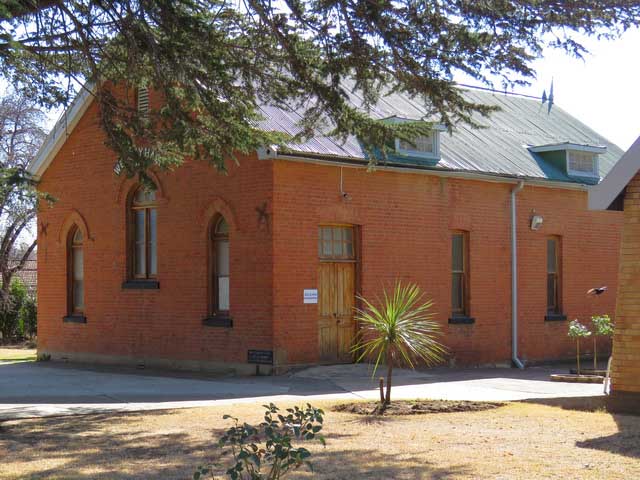Our next story comes with a twist as we noticed that the cornerstone of the Wesley Hall was laid by Mrs. Tom James. It left a question mark.
Who was Mrs Tom James?
 |
| The Chevy is doing a trip and parked in front of the Wesley Hall next to the Methodist Church. |
The Wesley Hall was built in 1906 and the cornerstone was laid by Mrs. Tom James on 17 January 1906. She was the eldest daughter of James Putterill. Her husband was a true supporter of the church and was for many years the Sheriff and Mayor of the town.
The old Methodist Church was demolished in 1967 – 1968 and the Record Stone of the previous stone was laid by James Putterill on 14 June 1882.
From the time Harrismith was established most of its inhabitants were English-speaking. The British settlers who emigrated to Natal during 1849-50 found the country in the Byrne Valley not suitable for traditional farming practices. Many went to settle in urban areas, while some returned to Britain. Encouraged by Mr Warden, about 1 500 settlers came to Harrismith.
The story of Anne as shared by Leon Strachan.
Mrs Tom James was Anne Putterill and has a truly sad but remarkable story.
Her father James Putterill was a Byrne settler with a big personality who owned land in Verulam before moving his family up to Harrismith in 1863. His eldest daughter, a tiny but stubborn 25-year-old woman refused bluntly to get married, even though women were in great demand in the Free State (in 1863 the Free State Republic had been in existence for only 9 years and was extremely sparsely populated).
Unfortunately, her disinterest did not prevent a man to fall in love with her. Anne didn’t want to have anything to do with him. When Anne’s strong-willed father (a grandchild referred to him as domineering) got wind of this he stepped in to salvage the situation. He instructed the man, a Welshman called Thomas James, to build a suitable house and furnish it. He, on the other hand, bought trousseau and a wedding dress for Anne and fixed a wedding date.
When Tom James completed his ‘solid cut stone house,’ James Putterill instructed his daughter to prepare for her wedding. Anne refused, she said she didn’t love Mr James and that was that.
The Putterill’s were a prominent family thanks to the very forceful James Putterill, who was an excellent businessman and played a leading role in the Wesleyan (Methodist) church, as he did in town affairs. Whilst guests filled the church in Warden street on Anne’s wedding day, he instructed his womenfolk to dress up the unwilling bride. He then continued to drive her to the chapel in his carriage, where he walked a very unhappy daughter up the aisle. He manoeuvred the obstructive girl into position next to the groom, while he flanked her on the other side ‒ urging a flabbergasted minister to get started. Don’t think James Putterill had won the battle of wills yet. Anne was unfazed, she declined bluntly to take the marriage vows in front of all the astonished wedding guests. She stood her ground, not unnerved at all. Putterill didn’t despair either, neither did he give up. It would be a battle of wills to the inevitable end.
Every time it was expected of the bride to answer the parson, James pushed his silent daughter’s head slightly down as if she nodded whilst signalling impatiently to an ever more uncomfortable parson to get on with it. The ceremony was thus unceremoniously consummated, and the unlikely couple settled shakily into the solid stone house.
They were childless (3 stillborn). Tom James turned out to be a stalwart who became sheriff and mayor of Harrismith. Both he and his wife loved fishing, they were often seen fishing together whenever an opportunity occurred. The 66-year old Tom died in 1894, after which Anne took in a Miss Dixon to keep her company. According to Beryl Osborn (Anne’s niece who penned the family history), they lived happily together until the British garrison arrived on Kings Hill in 1903, when disaster struck.
A striking and very charming young soldier, conveniently named private James, befriended the two elderly ladies. Young James told them he was an orphan with no home and no family, all alone in the world.
Besotted with him, Anne bought him out of the army and formally adopted him. The young man then gratefully proceeded to squander his adopted mother’s savings. Even when Anne had lost everything she owned, never an unkind word was uttered or anything damaging believed of the young man. He bolted unceremoniously out of the country when there was nothing left to spend.
The Putterill family had to club together to provide the necessary means for Anne and Miss Dixon, and their parrot, to live on. Anne rewarded them by living into her nineties.
Till next time
Hennie & Sandra




